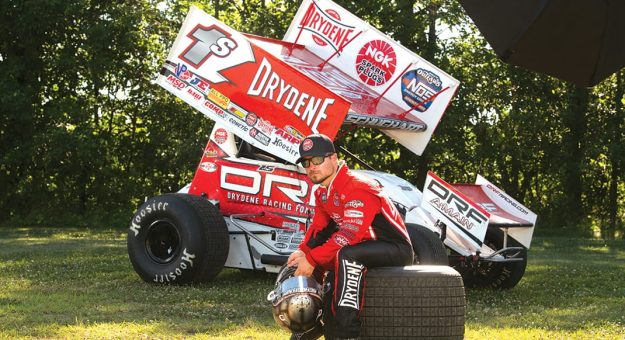More than a few summers have passed since Bobby Allen hung up his helmet, so it would be foolhardy to assume that younger fans appreciate his career.
More than a few summers have passed since Bobby Allen hung up his helmet for good, so it would be foolhardy to assume that younger fans truly appreciate his Hall of Fame career.
The numbers, and signature wins, are easy to run down. He was an original Outlaw and snagged 30 triumphs with the World of Outlaws NOS Energy Drink Sprint Car Series.
When the All Star Circuit of Champions began gathering momentum in Ohio and beyond, Allen was there as well. All told, he scored 46 All Star wins, and captured a big-paying win at Pennsboro, W.Va., during the 1983 season.
Then there is the bold notation on his resume that indicates in 1990, Allen pulled into Central Iowa and won the biggest sprint car race of them all, the Knoxville Nationals.
But even in the face of this list of accomplishments, Allen‘s backstory may well be far more interesting. His travels from Florida, where he had won a world karting championship, to the madcap Pennsylvania sprint car racing scene has been well documented.
Making his way north with friends Richard Lupo and Steve Smith, Allen did everything he needed to do to hang on and remain relevant.
It wasn‘t easy. He slept where he could, and many reached out to offer a helping hand. Taking everything into account from his appearance and demeanor, Lynn Paxton hung the nickname “Scruffy” on his fellow competitor and sometime teammate.
It stuck.
Allen‘s ability to blend in to his new surroundings was aided by his disarming personality. That, alone, hastened his acceptance by the sometimes-finicky fan base. Even more important, he also proved he could win.
Once he gained his bearings, Allen nailed down track titles at Lincoln (1967, ‘69 & ‘70), Susquehanna (1969) and Reading (1976). To add to the luster, in 1975 he was the best at the Williams Grove National Open.
When he cast his lot with the World of Outlaws, Allen ventured farther and farther from his Hanover, Pa., home. On the road he was, in many respects, Sammy Swindell‘s alter ego.
Where Swindell remained button downed, and came armed with an assemblage of equipment that looked to have arrived directly from the shop and carwash, Allen‘s operation was far from pristine. His cars showed all the battle scars that a breakneck schedule can produce, and his tow rigs were rarely state of the art.
Did it matter? Not really. After all, the prettiest car in any pit area isn’t always the one that ends up in victory lane.
What did matter, however, was survival. The same determination that marked his early days in the Keystone State, sustained Allen‘s drive to make racing a viable career somehow, someway.
In the early days of the Outlaws so many talented drivers and eager teams headed home with their tail between their legs, resources depleted, and their dreams in tatters. Through it all, Allen was there.
How did he do it? Allen had learned the most essential lesson of all: The ability to make it from race track to race track required brains, not just a heavy right foot.
When Allen and other capable regulars were building the World of Outlaws brand, it was a very different time. Open trailers could still be found, and sponsors still largely reflected the support of an enthusiast in the owner‘s hometown.
Today well-heeled teams have national sponsors and sport toterhomes and gleaming haulers capable of transporting multiple cars. That‘s only the start. Every contending team has an arsenal of spares, as well as a variety of other accessories from side-by-sides, to mini-bikes. To have less than this is seen somehow as slumming.
This was the new reality that Allen faced when he determined that the time had come to bring his son and grandson into the World of Outlaws fold. Scruffy, now wearing an owner‘s hat, was leading Shark Racing into a sparkling new world.
For some, the entire operation was a matter of curiosity. They were doing things their way, with a goal to get stronger by increments.
To just make it to the track, they did everything conceivable to stretch their relatively thin resources as far as they could. The team actually spent a winter building their own hauler, and once when the squad broke down on the road loyal fans started a GoFundMe effort to keep them going.
In short, they were easy to overlook, particularly if you weren‘t paying close attention.
Those who weren‘t distracted by mere window dressing began to understand that Shark Racing wasn‘t fooling around, and discerning eyes could see that Logan Schuchart had real talent. This shouldn‘t have been a surprise. Schuchart had enjoyed success at every step on the ladder, and his progression to the major leagues of sprint car racing was methodical.
When it came to racing, Schuchart says his grandfather has always been the guiding light.
“He has been the head honcho from the beginning,” he said. “I got my start at the go-kart track he had at that time. He set me up with a kart when I was two years old and I started racing competitively when I was eight.”
To continue reading, advance to the next page.
